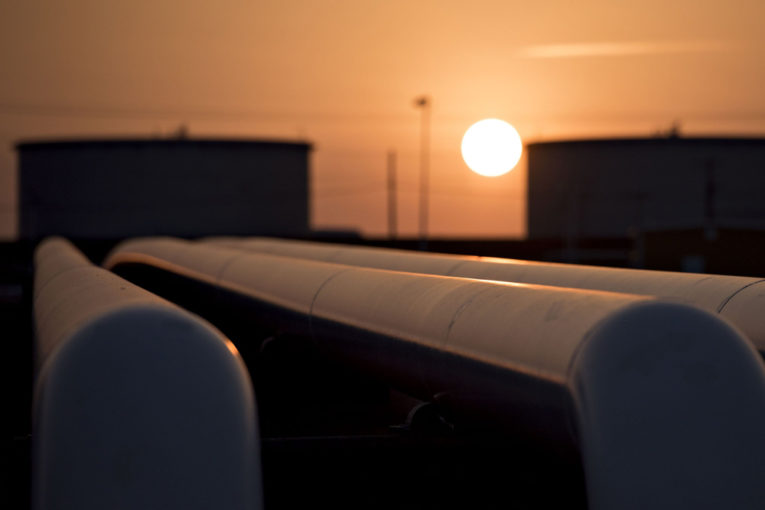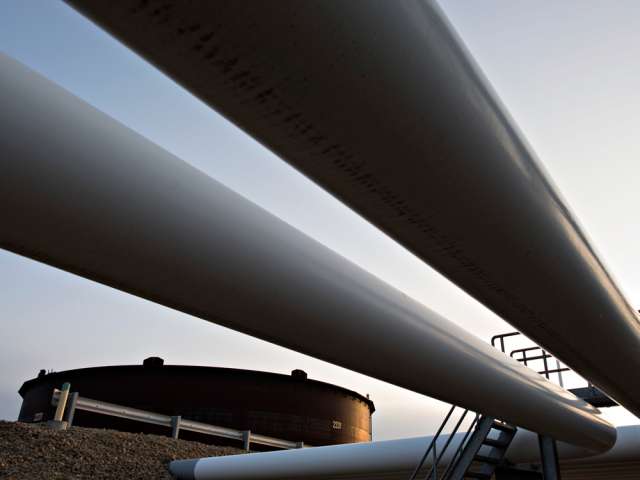
CALGARY — Canada’s major oil companies are blasting the country’s largest pipeline operator Enbridge Inc. as a “monopoly” in a fight over how its 2.9-million-barrels-per-day Mainline pipeline network should operate.
In letters filed with the Canadian Energy Regulator this week, both Canadian Natural Resources Ltd. and Suncor Energy Inc. urged that an application by Enbridge to re-contract its biggest pipeline system be delayed because of the coronavirus pandemic.
For months, Enbridge has been seeking CER’s approvals to sign contracts that would take up 90 per cent of the volume on the Mainline, which is the largest export network for Canadian crude. But the system has operated for decades as the spot market for Canadian crude and historically none of its capacity has been reserved for long-term contracts.
As a result, the application has led to a protracted fight between the pipeline giant and major producers.
“Enbridge’s insistence on continuing the hearing process under current conditions demonstrates a disregard for the plight of its customers which would not be possible in a more competitive industry and is further evidence of the monopoly power Enbridge exerts,” Canadian Natural Resource’s lawyers wrote in an April 20 letter filed with the CER.
“The CER’s economic regulation of Enbridge exists to serve the public interest, including the protection of shippers and producers from the exercise of monopolistic power. The current circumstances demonstrate why such protection is necessary,” they wrote.
Enbridge’s insistence on continuing the hearing process under current conditions demonstrates a disregard for the plight of its customers
Other oil export pipelines, such as the existing Trans Mountain and Keystone pipelines, do exist to move Western Canadian production albeit in smaller volumes than Enbridge’s Mainline system.
Canadian Natural and Suncor, as well as others such as Total E&P Canada, argue the coronavirus pandemic has forced oil producers to focus on more pressing issues such as the global collapse in crude oil prices and safely managing their workforce.
In a separate letter filed Wednesday, Suncor argued the pandemic made compiling relevant data and information related to Enbridge’s application more difficult.
“Important information includes the data sufficient to determine whether the proposed tolls are above a competitive, cost-reflective level and therefore represent an exercise by Enbridge of its market power, with respect to the provision of oil transportation services,” Suncor’s lawyers wrote.
These companies had previously said the Enbridge application would force them to sign contracts because competing pipeline projects such as the federally owned Trans Mountain expansion project and TC Energy Corp.’s Keystone XL had been delayed, leaving few options to move crude oil out of Canada.
Enbridge spokesperson Jesse Semko said in an emailed statement that his company would provide a written response to Canadian Natural and other parties involved in the regulatory process by May 1.
In an April 9 letter to the CER, Enbridge argued its application and related regulatory hearings should not be delayed. Oral submissions aren’t expected until the fall, written submissions could still be filed and a delay would be unfair to shippers that support the new contracts, Enbridge argued.
“Enbridge and its supporting shippers are entitled to have the application for approval of this new framework considered by the commission as expeditiously as the circumstances permit,” Enbridge lawyers wrote, noting that the CER had already developed guidelines during the coronavirus pandemic.
The fight has split Canadian oil producers against refineries in the U.S.
“The people that are for this are primarily U.S. refineries and companies that have interests in U.S. refineries,” said Jackie Forrest, senior director at ARC Energy Research Institute. She added the group opposed to the proposal accounts for 60 per cent of the total oil and natural gas liquids production in Western Canada.
It could also threaten some of Enbridge’s margins if the volume of oil moved on the Mainline every day falls.
The pipeline giant has had so much demand for space on the Mainline in recent years — as oil production surged and other pipelines such as the Trans Mountain expansion and Keystone XL were delayed — that it had to ration space on the Mainline, which takes Western Canadian oil to key refining markets in the U.S. Midwest.

Now that crude oil prices have collapsed during the coronavirus pandemic as commuters stay home and factories are closed, volumes on the Mainline are falling because oil producers have shut in and refineries have reduced their utilization.
The Western Canada Select benchmark price traded up 59.32 per cent midday on Wednesday to US$6.07 per barrel — a price that is still historically low and below the threshold most Canadian producers need to breakeven.
The Mainline is also among Enbridge’s largest assets and a key cash generator. As Canadian oil producers have shut in production during the recent oil price collapse, analysts predict the company’s cash flow will decline.
BMO Capital Markets analyst Ben Pham wrote in a research note April 13 that he expects a $12-million hit per month to the company’s earnings before interests, taxes, depreciation and amortization for every 100,000 bpd volume drop on the Mainline. Pham expects volumes to fall by 450,000 bpd in the second quarter, which would imply a $162 million drop in quarterly EBITDA.
“Given growing expectation of material Canadian oil production shut-ins combined with lower refinery demand, we have reduced our Mainline volumes,” Pham wrote.
Financial Post
• Email: [email protected] | Twitter: geoffreymorgan
You can read more of the news on source
